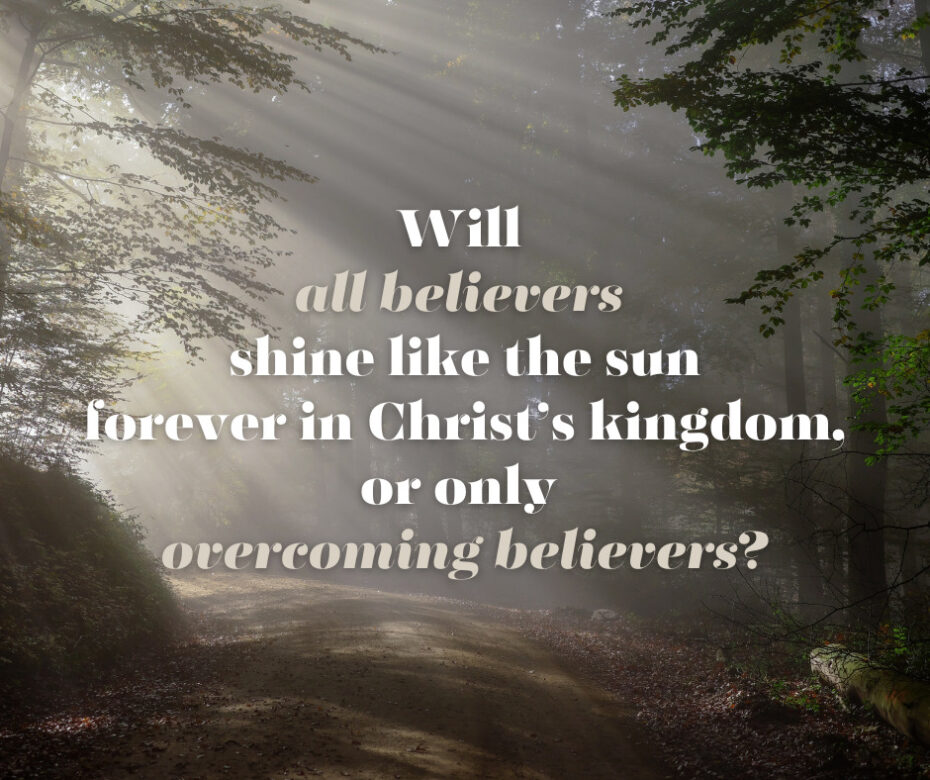Yesterday (July 23), I heard a sermon on this parable by Michael Hewett, Associate Pastor at Coppell Bible Fellowship. It was an excellent message.
As Michael spoke, I found myself wondering about this phrase in Matt 13:43, “Then the righteous will shine forth as the sun in the kingdom of their Father. He who has ears to hear, let him hear!” (emphasis added).
The Lord’s words here are quite similar to Daniel 12:2-3, “And many of those who sleep in the dust of the earth shall awake, some to everlasting life, some to shame and everlasting contempt. Those who are wise shall shine like the brightness of the firmament, and those who turn many to righteousness Like the stars forever and ever (emphasis added).
Most commentators understand Matt 13:43 as referring to an eternal experience all believers will have (e.g., Hal Haller, R. T. France, Leon Morris, Craig Blomberg, R. H. Lenski).
But I wonder.
The Lord may have been talking about an abundant eternal experience that only overcoming believers will experience. Compare, for example, 2 Pet 1:5-11; Revelation 2-3.
The interpretation is further complicated by the fact that Daniel 12:2-3 is also widely understood as referring to all believers shining forever.i However, it would be odd to refer to all believers as “those who are wise.” In the wisdom literature of both OT and NT, believers are not all wise. Believers are called to be wise. But that is not guaranteed.
If I’m reading G. H. Lang correctly, he takes the view that Matt 13:43 and Dan 12:3 both refer to faithful believers who will rule in the life to come, not to all believers (Pictures and Parables, pp. 119, 123). He says, “Every believer is indeed intended to have spiritual perception and so of increasing in the knowledge of God,” but only “such as do so are to be esteemed highly, to be accounted worthy of double honour” (p. 119).
So what difference does this make?
All believers will not shine equally in the kingdom (cf. Luke 19:16-26; 1 Cor 9:24-27; 2 Cor 5:9-10; Gal 6:7-9; 2 Tim 2:12; 4:6-8; Rev 2:26). Since both Dan 12:3 and Matt 13:43 refer to maximum shining, I would say that those verses refer to overcoming believers, not to all believers.
By the way, the expression the righteous often is used in the Gospels to refer to those who are righteous in their experience, not simply in their position (e.g., Matt 9:13; 25:37, 46; Mark 2:17; Luke 5:32; see also Luke 1:6).
The Parable of the Wheat and the Tares should cause us to live in light of the Lord’s soon return so that we might fully share in His coming glory (e.g., Matt 16:27).
By the way, Michael also made the excellent suggestion that the tares are servants of Satan, and that their job is twofold. They try to keep people from coming to faith in Christ. And they try to hinder the efforts of the wheat to lead others to faith and to disciple them into maturity.
Believer, you can be used by God both to lead people to faith and to help them mature so that they will shine forever in Jesus’ kingdom. What a wonderful calling we have.
__________
i Many commentators of Dan 12:3 see this shining as a reward, but suggest that it is a reward all believers will have since the commentators think that all believers will be faithful (e.g., J. Dwight Pentecost, Stephen Miller, Warren Wiersbe, Robert Chisholm). Note, however, that the United Bible Society Handbook seems to take the view that Dan 12:3 refers to victorious believers, not all believers: “This is not to be understood in terms of Christian theology (whereby believers are made righteous by the grace of Jesus Christ, see Titus 3:6–7). Rather, it is a question of wise teachers who instruct fellow Jews how to live in a right relationship with God. REB translates ‘those who have guided the people in the true path’” (Peter-Contesse and Ellington, A Handbook on the Book of Daniel, p. 325).


